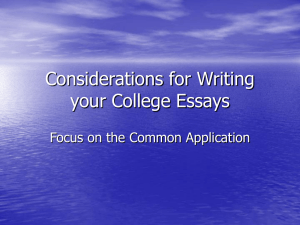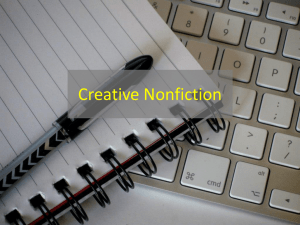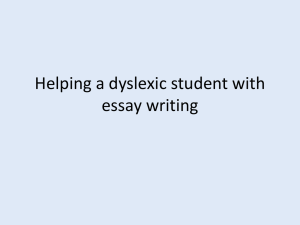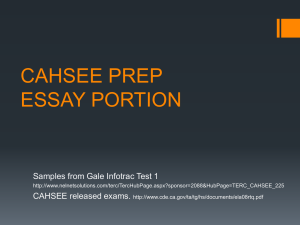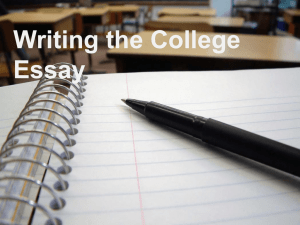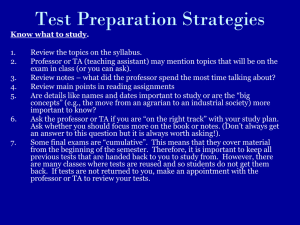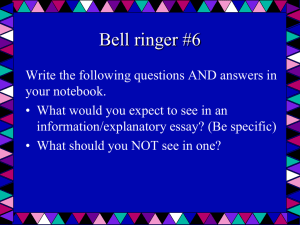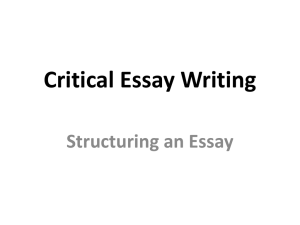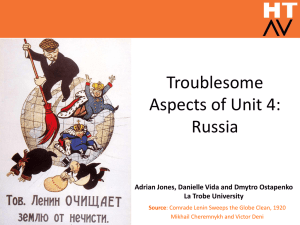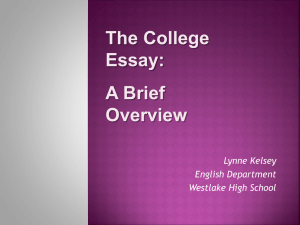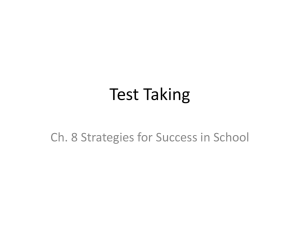MORE ESSAY WRITING
advertisement
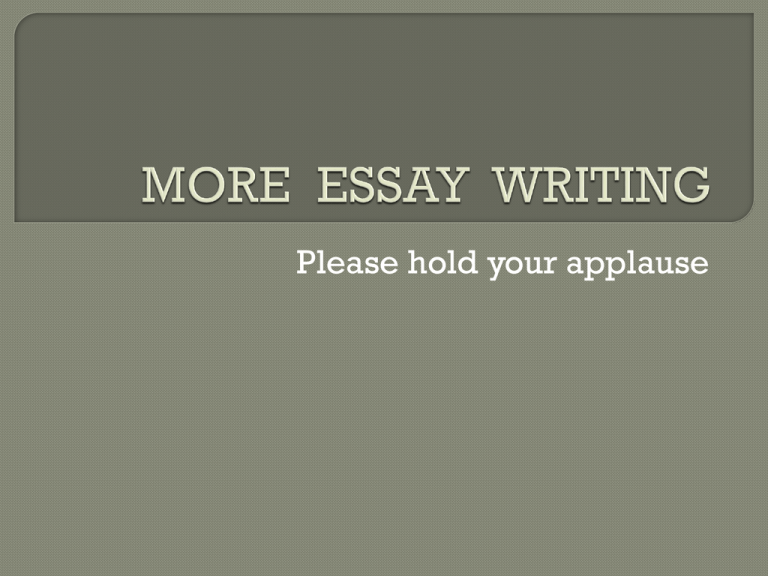
Please hold your applause Stay away from informal speech (pretend you are writing to a teacher that you respect and who listens to what you have to say, expecting mature thoughts) • Examples of informal speech: “like”, “totally”, “for sure” Understand and stay on-topic. An off-topic essay will receive a score of zero. Indent Make your paragraphs! statements not opinions Watch for redundancy: • Example: It’s amazing how technology has amazingly advanced. • Also communication in less time is quicker too. Write legibly They give you two pages to write because they want you to write 2 pages (don’t write more) Use synonyms, don’t repeat the same words over and over and over and over and, well you get the point. You will PICK ONE SIDE and explain why it is right. Demonstrate that you understand both sides, but pick one and explain why it is correct. • Use words like, “Even though” “However” “On the contrary” “despite” etc. to show your opposite stance • Example: Even though technology offers many benefits, it has proven to be very harmful towards interpersonal communication. Show that you have a command of sentence structure. Use complex sentences sometimes, midsized sentences sometimes, and two-word sentences a few times to make your writing more interesting. Also--don’t keep repeating the same point by rewording it several ways. Readers will see right through that. Make sure your body paragraphs are about the same length Transitions are key • Never underestimate the power of transitions, particularly in your topic sentences. Words and phrases such as "In addition," "However," "Similarly," "Likewise," and "Furthermore" indicate the relationship between the various parts of your argument. • Do NOT start a new paragraph with one of these transitions. That would be contradictory. Use a personal example, and don’t hesitate to make it up. Use a quote in the conclusion and/or introduction if possible. “Those who cannot change their minds cannot change anything” -George Bernard Shaw “To avoid criticism, do nothing, say nothing, be nothing” – Elbert Hubbard “Many of life’s failures are people who did not realize how close they were to success when they gave up” – Thomas Edison. “You must be the change you wish to see in the world” – Gandhi “Reality is merely an illusion, albeit a very persistent one.” - Albert Einstein “You can do anything, but not everything.” —David Allen “Never leave that till tomorrow which you can do today.” -Benjamin Franklin “To err is human, to forgive divine.” -Alexander Pope “Knowledge is power.” -Francis Bacon “Insanity is doing the same thing, over and over again, but expecting different results.” -Albert Einstein “If you want to know what a man's like, take a good look at how he treats his inferiors, not his equals.” -J.K. Rowling “If you don't stand for something you will fall for anything.” -Malcom X “Whenever you find yourself on the side of the majority, it is time to pause and reflect.” -Mark Twain “The man who does not read has no advantage over the man who cannot read.” -Mark Twain “That which does not kill us makes us stronger.” -Friedrich Nietzsche “Darkness cannot drive out darkness: only light can do that. Hate cannot drive out hate: only love can do that.” -Martin Luther King Jr. Independent Thinking vs. Conformism 1. • Should we learn for ourselves or learn from others? What is the value of creative thinking? Truthfulness 2. • Is honesty always the best policy? Is truth (or the value of truth) relative? Selfishness/Competition vs. Generosity/Cooperation 3. • Can competition or selfishness be good? Change 4. • How and why do people change? Is change good or necessary? Success vs. Failure 5. • Learning from Different Perspectives 6. • Are our biases harmful? Can we benefit from the perspectives of others? Responsibility 7. • What are our responsibilities to ourselves and to our society? Evaluating Modern History 8. • 9. What and how can we learn from our failures? What is success, and how can we achieve it? What do you think of the world today and how it's changing? Decision Making • How can we make sound decisions? What guides our decision-making process? Know vs. now It’s and is Has vs had + ed Maintain vs. keep “The” Technology Verb tenses This vs. these There, they’re, & their We would like to think that progress causes problems to be solved completely, and sometimes that happens. For example, some diseases that once posed a serious threat are no longer a problem, thanks to modern medicine. Some problems can be solved, and they go away. But as often as not, problems exist in a chain of cause and effect: for each problem solved, a new one develops. • Adapted from Gregg Easterbrook, The Progress Paradox: How Life Gets Better While People Feel Worse Assignment: Does progress reduce the number of problems in the world, or does solving old problems just lead to new ones? Plan and write an essay in which you develop your point of view on this issue. Support your position with reasoning and examples taken from your reading, studies, experience, or observations. Common sense tells us that people tend to get along better with those who are like them, who think and act as they do. Many people, however, get along very well with people who are very different from them and may prefer to associate with those whose views and actions are different from their own. In fact, some people even complain that they are bored and irritated by those who are too much like them. Assignment: Do people tend to get along better with people who are very different from them or with those who are like them? Plan and write an essay in which you develop your point of view on this issue. Support your position with reasoning and examples taken from your reading, studies, experience, or observations. “The weak can never forgive. Forgiveness is the attribute of the strong.”-M.K.Gandhi Assignment: Is it true that only weak can never forgive? Or in this modern world, forgiveness is attributed to the ones who are weak? Plan your outlook on the issue and then formulate the essay with substantial evidence from your daily observation or experiences. Support your argument. From early childhood, we are encouraged—pressured, even—to be in the company of others: we are urged to belong to this or that group, to join this or that club, to spend time with this or that friend. People do everything to avoid being by themselves, treating solitude as though it were the equivalent of loneliness. And yet it is only when people are by themselves that they can truly achieve their most important goals. Assignment: Is solitude—spending time alone—necessary for people to achieve their most important goals? Plan and write an essay in which you develop your point of view on this issue. Support your position with reasoning and examples taken from your reading, studies, experience, or observations. “Courage is resistance to fear, mastery of fear - not absence of fear.” – Mark Twain Assignment: Courage, is it only resistance to fear? Is absence of fear possible? Plan your essay after clearly understanding the issue under discussion and then proceed to write an essay with suitable examples that can support your essay. Although most of us do not like being criticized, it is said that we can always benefit from being told what we are doing wrong. We may lose a valuable learning opportunity if we do not listen to the criticisms expressed by others. Yet criticism, even when honest and well-intended, can be more harmful than helpful. We have more to gain by ignoring or shielding ourselves from the criticisms of others. Assignment: Are people better off if they do not listen to criticism? Plan and write an essay in which you develop your point of view on this issue. Support your position with reasoning and examples taken from your reading, studies, experience, or observations. “Discipline” is a negative word for many people because it is associated with rigorous training, strict rules, and strong self-control. But we fail to realize that freedom comes only through discipline. Discipline compels us to sacrifice immediate rewards and pleasures, but it also gives our lives structure and prevents us from making costly mistakes. It keeps us from being subject to our impulses and weaknesses and thus frees us to achieve our true goals. Assignment: Do people need discipline to achieve freedom? Plan and write an essay in which you develop your point of view on this issue. Support your position with reasoning and examples taken from your reading, studies, experience, or observations. The making of illusions—misleading images or ideas that appear to be authentic or true—has become the primary business of our society. Included in this category are not only the false promises made by advertisers and politicians but all of the activities which supposedly inform, comfort, and improve us, such as the work of our best writers and our most influential leaders. These promises and activities only encourage people to have unrealistic expectations and to ignore facts. • Adapted from Daniel J. Boorstin, The Image Assignment: Are people overly influenced by unrealistic claims and misleading images? Plan and write an essay in which you develop your point of view on this issue. Support your position with reasoning and examples taken from your reading, studies, experience, or observations. The word “uncompromising” is often used as a compliment, especially when it describes someone who is completely dedicated to certain principles and values. Uncompromising people have indeed recorded great achievements. But being uncompromising is not always a virtue. People who are uncompromising tend not to consider other people’s views, seeing themselves as right and everyone else as wrong. All in all, it is better to be flexible and make compromises. Assignment: Are people more likely to achieve their goals by being flexible or by refusing to compromise? Plan and write an essay in which you develop your point of view on this issue. Support your position with reasoning and examples taken from your reading, studies, experience, or observations. We are often encouraged to stop worrying about making mistakes and advised not to dwell on those we have already made. But without analyzing mistakes—decisions and actions that made a project fail, for instance—how can anyone be successful? Besides, there are some wellknown mistakes others have made that seem worth studying carefully. Perhaps these mistakes could have been prevented if those responsible had been more concerned about making mistakes in the first place. Assignment: Do people have to pay attention to mistakes in order to make progress? Plan and write an essay in which you develop your point of view on this issue. Support your position with reasoning and examples taken from your reading, studies, experience, or observations.
